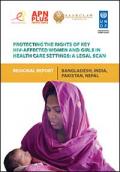Publications - Released in 2013
It is indeed a great achievement that gender equality is a fundamental element of the constitutions of all countries in South Asia, yet women and girls continue to be discriminated against within their homes, in schools, in the work place, in institutional settings, and even by law. More specifically, discrimination is especially strong among women and girls who are affected by HIV.
This report looks into existing constitutional provisions, laws, and legal mechanisms in Bangladesh, India, Nepal, and Pakistan, and identifies provisions that provide protection or redress for violations of rights at health care settings. While the report focuses specifically on key HIV-affected women, the legal provisions identified also apply to the general population (including marginalized groups, such as disabled and very poor women) whose rights might be violated in health care settings.
The report demonstrates that there are serious gaps in laws to provide protection and redress for violation of rights at health care settings in the four countries under discussion. While the constitutions in all four countries guarantee equality under the law and prohibit discrimination based on sex, there are only a few laws or legal mechanisms that women can use to access justice if these rights have been violated in health care settings.
Downloads
Organizations
- United Nations Development Programme (UNDP)
- Asia Pacific Network of People Living with HIV/AIDS (APN+)






